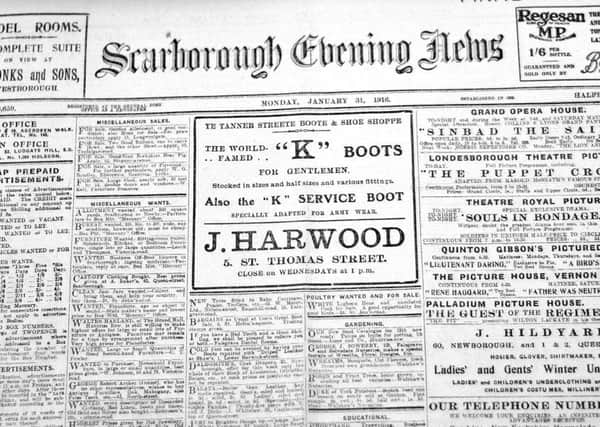1916 court: Soldier fined for causing an obstruction with car


Lieutenant Charles Henry Waring, Northern Cavalry Depot, Burniston Road, was summoned for obstructing the free passage of St Thomas Street by means of a motorcar on December 18th. There was no appearance.
The chief constable, addressing the bench, said they would remember that at a previous hearing Lieutenant Waring wrote asking that the summons might be postponed until that day in view of his not being able to attend on January 7th. The chief offered no objection, and the magistrates adjourned the case. On the following Saturday the chief received a further letter dated the previous Friday, from Lieutenant Waring, saying he had received orders to proceed to service and had to leave Scarborough the following day, so that he would be unable to attend court. He hoped the case would therefore be settled out of court. From enquiries that the chief had made, he learnt that defendant had not gone to the front, but was at Tidworth with his reserve regiment. The chief wrote to him at Tidworth, informing him that the case could not be settled out of court, but that if he had any further explanation to make the chief would place it before the magistrates. He did not hear further from him.
Advertisement
Hide AdAdvertisement
Hide AdInspector Thompson said on the day in question, about 9.12pm, he was standing outside the Opera House, where he noticed a motorcar without anyone in charge of it. Witness made enquiries, and ascertained from the theatre attendant that the owner of the car was in the theatre. At the inspector’s request the attendant went into the Opera House to bring Waring out. The defendant came back with the attendant. Witness spoke to him about the car, telling him he was not allowed to leave it there. In answer to this Waring said something to the effect that it was a pity they (meaning the police) had nothing else better to do but to bother people about motorcars and lights, and also said something about his not knowing his duty. The defendant then went into the building again to bring out a lady who was with him and they both drove away about 9.40pm. During the time from when witness first saw the car to the time it drove away the car was left without anyone in attendance, with the exception of the five minutes talk he had outside with the lieutenant. The car during the whole of the time caused obstruction of the road way.
By the chairman: There was not much traffic about the road during the time. He had the car under observation from 9.12pm to 9.40pm.
James Wade, theatre attendant at the Opera House, St Thomas Street, said on the evening of December 8th he saw the defendant, Lieutenant Waring, arrive at the Opera House in a motorcar. He left the car outside the pit entrance. He spoke to the attendant saying: “Will my car be all right left outside?” Witness replied in the negative, adding the police would not allow it - they would perhaps come down and have it removed and call the lieutenant out of the building. “Well then,” the lieutenant said, “I’ll chance it - I’ll risk it.” With that he went into his private box with a lady.
Soon afterwards Inspector Thompson arrived. He came up and spoke to the attendant, and in consequence of what witness told the inspector he (attendant) went into the theatre and up to the lieutenant’s box. Witness said to him “You are wanted in the front hall.” He said, “Who is it?” Witness replied “A policeman wants you about the car.” To this he said, “What do they damn well want?” After that nothing further was said and witness went back to the inspector without the lieutenant. Complying again with the inspector’s request, witness went up to the defendant again, saying, “The police are anxiously waiting for you outside.” He said, “All right, I’ll come.”
Advertisement
Hide AdAdvertisement
Hide AdHe accompanied witness downstairs and afterwards heard him speaking to Inspector Thompson. After a little while the lieutenant went back into the theatre for the lady and drove away about 9.40pm. Witness saw the car standing outside from about 8.30pm until about 9.30pm.
The chief constable, in the box, said Lieutenant Waring came to see him on January 7th, and he complained that he was not given any caution. The chief explained to him that his invariable practice had always been to give cautions to the owners of the cars themselves. He told him that in this particular case he (the chief) treated the statement of the theatre attendant as the necessary caution. The lieutenant then said, “Oh well I can’t bother about it. My defence is that I was ignorant of the fact that I could not stand my car outside. In some towns you are allowed to do this.”
He said he could not attend court on the Friday because he was going out shooting. Witness understood the shooting to mean part of his military duties, but he learnt this was not so.
This concluded the evidence.
The magistrates found the case proved. Defendant must pay a fine of 10s 6d.